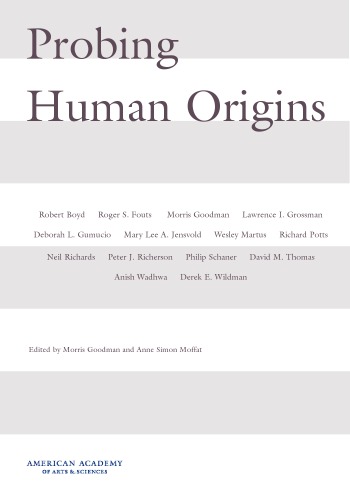

Most ebook files are in PDF format, so you can easily read them using various software such as Foxit Reader or directly on the Google Chrome browser.
Some ebook files are released by publishers in other formats such as .awz, .mobi, .epub, .fb2, etc. You may need to install specific software to read these formats on mobile/PC, such as Calibre.
Please read the tutorial at this link: https://ebookbell.com/faq
We offer FREE conversion to the popular formats you request; however, this may take some time. Therefore, right after payment, please email us, and we will try to provide the service as quickly as possible.
For some exceptional file formats or broken links (if any), please refrain from opening any disputes. Instead, email us first, and we will try to assist within a maximum of 6 hours.
EbookBell Team

4.4
52 reviews
ISBN 10: 0521372933
ISBN 13: 9780521372933
Author: Robert Boyd, Morris Goodman, Anne Simon Moffat
“Probing Human Origins” explores, from various perspectives, how humans became human. This collection of papers acknowledges the importance of genetic ‘blueprints’ but rejects the idea that the DNA sequence of the human genome contains a book of instructions that defines being human. Instead, it promotes the idea that during humankind’s evolutionary history, genic changes occurred in ancestral genomes that were positively selected to help shape the distinctive human phenotype. This view complements the idea that our social and physical environments guide how we act. Thus, a major trend in humankind’s evolutionary history has been the selection of genomes that gave their bearers the brain power to use learned, culturally transmitted behaviors to cope successfully with an increasing range of external challenges. Paradoxically, because of humankind’s genetic evolution, the future of the human species now depends most heavily on further cultural-social evolution rather than biological evolution.
PART! FOLKBIOLOGY 2 FOLKTAXONOMY
2.1 In the beginning.... 2.2 A basic level
2.3 Life-forms
2.4 Exceptions that prove the rule 2.5 Family fragments
3 THE SEMANTICS OF LIVING KINDS 3.1 Domain specificity
3.2 Meaning as a motley
3.3 Nature and necessity
3.4 Phenomenal reality and nomic theory 3-5 Kinds of natural kinds
PART II ARISTOTELIAN ESSENTIALS
4 ESSENCE AND ENVIRONMENT
4.1 Essentialism reconsidered
4.2 "Induction"
4-3 Form and matter
5.1 Genos and Eidos
sa
Division and assembly
53 Analogy
5.4 Failure's triumph
PART III FROM HERBALS TO SYSTEMS
6 ORIGINS OF THE SPECIES CONCEPT
6.1 Back to nature
6.2 Charting new territory 6.3 Species forever
6.4 Omnia ex ave
7 THE NATURE OF THE GENUS
7.1 Fruits of reason
7.2 Trial and error 7.3 Art and intuition 7.4 Paradise regained
PART IV THE SCIENTIFIC BREAKAWAY
8 THE METHOD OF FAMILIES AND CLASSES
3.1 Stress and strain
8.2 And the walls came tumbling down 8.3 Piecing together the fragments
8.4 Organization
8.5 End of series
9 SCIENCE, SYMBOLISM AND COMMON SENSE
9.1 Savage savvy
9.2 Cognitive "pathogenesis"
9.3 Speculating
9.4 Plants as animals
9.5 The analogy of nature
9.6 Man dethroned
9.7 Dispositions to susceptibilities
CONCLUSIONS
10 RUDIMENTS OF THE LINNAEAN HIERARCHY:
TOWARDS AN ANTHROPOLOGY OF SCIENCE
APPENDIX MILESTONES OF NATURAL HISTORY
NOTES
REFERENCES
INDEX
probing the human race
probing definition alien
probing ancient aliens
probing definition urban dictionary
a human origin
Tags: Robert Boyd, Morris Goodman, Anne Simon Moffat, Probing Human Origins